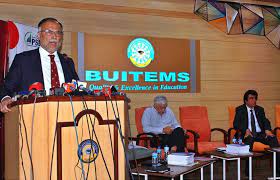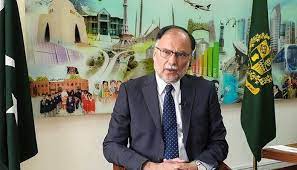Development of Balochistan top priority of govt: Ahsan Iqbal

Islamabad: Minister for Planning, Development and Special Initiatives Professor Ahsan Iqbal emphasized the need for investing in higher education to create upward social mobility while reiterating that the government was committed to uplift Balochistan.
The minister made these remarks while addressing 36th AGM of the Pakistan Society of Development Economists (PSDE) held in Quetta on Thursday. The conference was organized by the Pakistan Institute of Development Economics (PIDE) in collaboration with Balochistan University of Information Technology, Engineering, and Management Sciences (BUITEMS). The theme of the conference was ‘Charter of Economy: Investment, Productivity, and Employability’.
The minister while emphasizing the importance of inclusive development said that the incumbent government had started a special project to uplift 20 poorest districts of Pakistan, “out of which 11 are of Balochistan.”

Last month, the Ministry had launched a special development initiative worth Rs 40 billion for 20 backward and poor districts of the country. The minister is expected to visit the 20 poorest districts next month. The 11 districts of Balochistan include Sherani, Kohlu, Jhal Magsi, Barkhan, Killa Abdullah, Zhob, Musakhel, Dera Bugti, Jaffarabad, Ziarat and Killa Saifullah.
“This is the first of its kind project in the economic history of Pakistan where the federal government is undertaking a national intervention to uplift the poorest districts and address the disparity in economic development,” said the minister.
Ahsan also highlighted a short-term economic agenda of the incumbent government in the form of 5Es which include enterprise, exports, equity in society through strengthened health and education. The identification of the 20 poorest districts for accelerated growth programme, E-Pakistan and empowerment of youth, energy efficiency and conservation, and environment and food security were among the 5Es.
The minister highlighted the expansion of university campuses in remote areas of Balochistan by the Planning Commission from 2013-18. He also emphasized the need for political stability and policy continuity for the success of economic initiatives such as the China-Pakistan Economic Corridor (CPEC).
He also stressed the need for dialogue and engagement to address social and political differences and counter growing intolerance. The minister congratulated PIDE and BUITEMS for conducting a successful conference.
The charter is a document prepared by the PIDE, which presents a blueprint of some solutions for Pakistan’s ailing economy. The discussion focused on the delineation of economy and politics, civil service reforms, taxation, governance, and devolution. Panelists included Vice Chancellor of PIDE Dr Nadeem Ul Haque, and VC of BNU Shahid Kardar.





